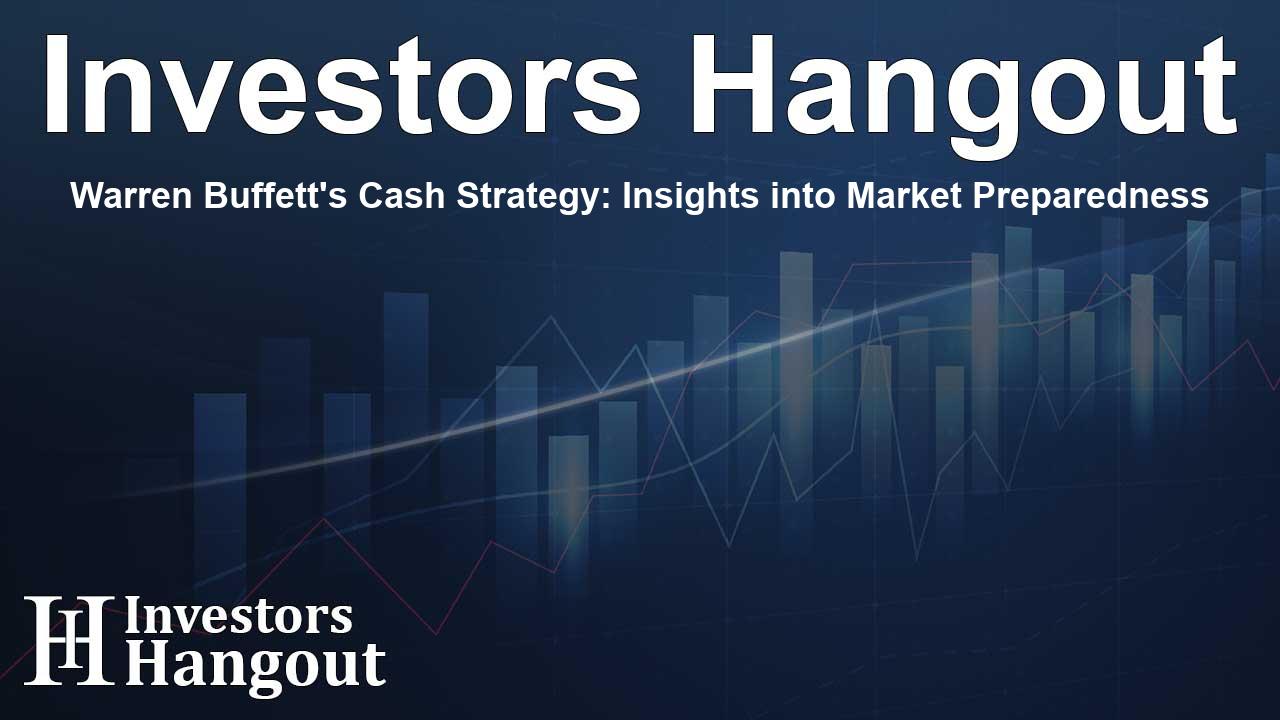Warren Buffett's Cash Strategy: Insights into Market Preparedness

Warren Buffett's Strategic Cash Reserve Insights
Berkshire Hathaway Inc. (NYSE: BRK) has recently gathered a mammoth cash reserve of $325 billion, marking a significant increase from previous years. This cash stockpile is the largest in the company's history and has garnered attention due to its alignment with a noteworthy valuation metric favored by Warren Buffett, which looks at the stock market's value in relation to the broader U.S. economy. Such a strategy could suggest that Buffett is adopting a cautious stance as the market shows signs of possible downturns; however, there is a deeper understanding of this move.
Understanding Buffett's Long-Term Investment Philosophy
According to industry experts like Nir Kaissar, founder of Unison Advisors, Buffett himself acknowledges his inability to accurately predict short-term market fluctuations. Instead, he adopts a long-term perspective, focusing on sustained returns rather than market timing. This enduring strategy has guided how Berkshire Hathaway allocates its assets over time, ensuring they align with anticipated returns rather than momentary market trends.
The Evolution of Berkshire's Cash Allocation
Buffett's cash allocation has shown a notable trajectory, escalating from a mere 1% back in 1994 to an impressive 28% currently. This trend is not coincidental; it reflects Buffett's historical pattern of increasing cash reserves during market booms when asset valuations rise, while simultaneously investing that cash strategically when market conditions shift and opportunities emerge. Kaissar’s insights reinforce that this move is not just precautionary but also tactical.
Lessons from History: Internet Bubble and Financial Crisis
Historical precedence illustrates Buffett's methodology effectively. During the 1990s internet bubble, he significantly increased cash holdings amid skyrocketing valuations. Similarly, ahead of the 2008 financial crisis, Buffett's buildup of cash reserves positioned him to invest in undervalued assets, including a timely equity stake in Goldman Sachs. Such actions exemplify his keen understanding that asset valuations and expected returns are inversely related; when the market gets overly inflated, the yield potential dims, warranting a buildup of cash reserves.
Current Market Conditions and Future Expectations
Presently, the market-to-GDP ratio stands at unprecedented heights, suggesting that future returns may continue to dwindle. Even with cash yields reflecting those seen during previous booms, Buffett’s extensive cash reserves indicate a strategic endeavor to capitalize on potential market dislocations. This strategy positions Berkshire Hathaway to seize investment opportunities in uncertain times, aligning with Buffett's long-standing commitment to prudent capital management.
Speculations Surrounding Berkshire's Cash Reserve
The sharp increase in Berkshire’s cash reserves has led to a flurry of speculations regarding Buffett's intentions. Some analysts ponder whether this accumulation signals an upcoming market downturn or if it serves another purpose, like preparing for a significant acquisition or a potential share buyback strategy, especially as discussions of succession surface.
Upcoming Management Transitions and Strategic Moves
Analysts such as Jeff Muscatello from Douglass Winthrop have noted that the anticipated transitions in management could motivate Buffett to streamline the company’s finances, allowing easier navigation for the next generation of leaders. This aligns perfectly with the philosophy of maintaining financial flexibility during periods of change.
Opinions from Market Influencers
Market perspectives are diverse, with figures like Michael Saylor, co-founder of MicroStrategy Inc., criticizing Buffett's hesitance to invest more aggressively, particularly in emerging fields like cryptocurrency. Saylor believes that the potential held within their cash reserves could revolutionize investment strategies if employed tactically.
Frequently Asked Questions
What is Warren Buffett's investment approach?
Warren Buffett adopts a long-term investment philosophy, focusing on asset allocations based on expected future returns rather than attempting to time market movements.
What does the $325 billion cash reserve imply?
Buffett's significant cash reserve may indicate preparations for strategic investments during uncertain market conditions, although it can also reflect caution against overvalued assets.
How has Berkshire's cash allocation changed over the years?
Buffett's cash allocation has grown from 1% in 1994 to 28% currently, reflecting a historical pattern of increasing cash during market booms.
What lessons can be learned from the internet bubble and the 2008 crisis?
Buffett’s actions during these crises illustrate the importance of responding to market valuations by adjusting investment strategies to preserve capital for future opportunities.
Could management transitions influence Buffett's decisions?
Yes, anticipated changes in management could lead Buffett to enhance Berkshire's financial positioning in anticipation of direction changes and new leadership strategies.
About Investors Hangout
Investors Hangout is a leading online stock forum for financial discussion and learning, offering a wide range of free tools and resources. It draws in traders of all levels, who exchange market knowledge, investigate trading tactics, and keep an eye on industry developments in real time. Featuring financial articles, stock message boards, quotes, charts, company profiles, and live news updates. Through cooperative learning and a wealth of informational resources, it helps users from novices creating their first portfolios to experts honing their techniques. Join Investors Hangout today: https://investorshangout.com/
Disclaimer: The content of this article is solely for general informational purposes only; it does not represent legal, financial, or investment advice. Investors Hangout does not offer financial advice; the author is not a licensed financial advisor. Consult a qualified advisor before making any financial or investment decisions based on this article. The author's interpretation of publicly available data shapes the opinions presented here; as a result, they should not be taken as advice to purchase, sell, or hold any securities mentioned or any other investments. The author does not guarantee the accuracy, completeness, or timeliness of any material, providing it "as is." Information and market conditions may change; past performance is not indicative of future outcomes. If any of the material offered here is inaccurate, please contact us for corrections.